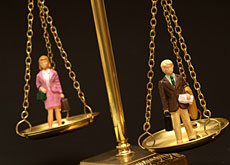Sexual harassment widespread in Switzerland

Half of Swiss workers encounter some type of sexual harassment in the course of their working lives, a study has found.
In two-thirds of cases, the workplace harassment originates from men. Women are the aggressors in 15 per cent of cases and mixed gender groups are responsible for the remainder.
The research, the first to cover men and women at a national level, was carried out for the Federal Gender Equality Office and the State Secretariat for Economic Affairs (Seco).
Those working part-time and in teams, younger women, people with dual nationality and newcomers are more likely to suffer sexual harassment.
Respondents were asked if they had directly or indirectly experienced 12 types of behaviour classed as sexual harassment.
By far the most common type of behaviour cited by both sexes was degrading or obscene jokes and comments.
Offensive comments
More women complained of ogling looks, offensive personal comments and unwanted physical contact. Male victims of harassment were more likely to suffer unwanted phone calls and emails, obscene gestures and sexual innuendo.
In the past 12 months, ten per cent of women and four per cent of men said they had been victims of sexual harassment. This rises to 28 per cent and ten per cent respectively over the course of their working life.
Patricia Schulz, director of the equality office, told swissinfo that the consequences for the wellbeing and health of the individual could be severe.
“One of the first consequences is the desire to resign because the working environment becomes unbearable for the person. Their dignity is wounded, they feel devalued and humiliated… We know there are many cases of depression and time off work due to sexual harassment.”
Schulz said she was surprised by the scale of the problem. “I was surprised by the proportion of men who said they had been sexually harassed. It’s a lot more than expected, also in comparison with international studies.”
Awareness
Presenting the results at a news conference in Bern, Hans-Ulrich Scheidegger from Seco said it was important to know the full scale of sexual harassment in Switzerland.
“The aim of the research was to establish a knowledge base to allow us to inform employers in a targeted way and to make them aware of the necessity of introducing preventative measures,” Scheidegger said.
The publication of the study is accompanied by an awareness campaign, which includes brochures for employees and employers and an information website (see link).
Schulz pointed out that companies also lose out due to sexual harassment. “The person concerned is demotivated, less productive and there is a risk of absenteeism. There are also costs associated with recruitment because victims of sexual harassment are very likely to leave their job if they don’t feel supported by their employer.”
Sexual harassment covers a wide range of behaviour based on unwelcome attention of a sexual nature. It ranges from mild transgressions and annoyances to serious abuses, which can go as far as sexual assault and rape.
Harassment can take the form of words, gestures or acts. It can be carried out by individuals or groups.
Employers are legally obliged to create a working environment free from harassment.
Victims of sexual harassment are advised to defend themselves in the first instance against the person who is bothering them by telling them clearly that their behaviour is unwelcome and unacceptable. This can also be done in writing.
If the problem persists, it is useful to keep a record of incidents, times, participants and witnesses.
Speak to other colleagues about the problem to look for support and backup. Inform management or the designated person in the workplace.
If you do not receive the kind of protection or support that you need from your employer, other external options for advice include union representatives, equality offices or work associations.
(advice from Seco and the Federal Gender Equality Office)

In compliance with the JTI standards
More: SWI swissinfo.ch certified by the Journalism Trust Initiative



You can find an overview of ongoing debates with our journalists here. Please join us!
If you want to start a conversation about a topic raised in this article or want to report factual errors, email us at english@swissinfo.ch.